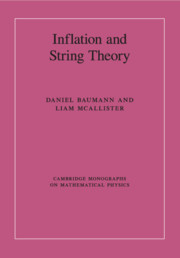Book contents
- Frontmatter
- Dedication
- Contents
- Preface
- Notation and conventions
- 1 Inflation: theory and observations
- 2 Inflation in effective field theory
- 3 Elements of string theory
- 4 What is string inflation?
- 5 Examples of string inflation
- 6 Conclusions and outlook
- Appendix A Mathematical preliminaries
- Appendix B The effective theory of inflation
- Appendix C Primordial perturbations from inflation
- References
- Index
6 - Conclusions and outlook
Published online by Cambridge University Press: 05 May 2015
- Frontmatter
- Dedication
- Contents
- Preface
- Notation and conventions
- 1 Inflation: theory and observations
- 2 Inflation in effective field theory
- 3 Elements of string theory
- 4 What is string inflation?
- 5 Examples of string inflation
- 6 Conclusions and outlook
- Appendix A Mathematical preliminaries
- Appendix B The effective theory of inflation
- Appendix C Primordial perturbations from inflation
- References
- Index
Summary
Our mistake is not that we take our theories too seriously, but that we do not take them seriously enough. It is always hard to realize that these numbers and equations we play with at our desks have something to do with the real world. Even worse, there often seems to be a general agreement that certain phenomena are just not fit subjects for respectable theoretical and observational effort.
Steven Weinberg, on the Big Bang model [852].Consistent theories of quantum gravity do not grow on trees. After a search spanning nearly a century, string theory is the only known example of such a theory. Of course, it does not follow that string theory describes our universe; mathematical consistency is a necessary requirement, but it is far from sufficient. To connect string theory to particle physics and cosmology, we must seek guidance from terrestrial experiments and from observations of the cosmos. One should not be surprised that experimental evidence is elusive, for quantum gravity is naturally relevant at scales many orders of magnitude beyond those accessed on Earth. Running the theory to low energies and extracting predictions that are sensitive to its high-scale origin have proved challenging. However, the early universe provides an arena where ideas about quantum gravity can be tested, and the initial singularity of the Big Bang model is a prime example where a theory of quantum gravity is compulsory. Quantum fluctuations of the metric during inflation, imprinted in primordial B-mode perturbations of the CMB, are the most vivid evidence conceivable for the reality of quantum gravity, and for the significance of quantum gravity in the early history of our universe.
Inflation defers the singularity problem, allowing us to make predictions for the initial conditions that emerge from the aftermath of the Big Bang. However, as we have shown, the inflationary mechanism retains a subtle sensitivity to Planckscale interactions. This is both a challenge for microscopic theories of inflation, as well as an opportunity for using the early universe as a window on Planck-scale physics. To fulfill this promise, inflationary scenarios in string theory must be developed to an unprecedented level of completeness and sophistication.
- Type
- Chapter
- Information
- Inflation and String Theory , pp. 262 - 264Publisher: Cambridge University PressPrint publication year: 2015



